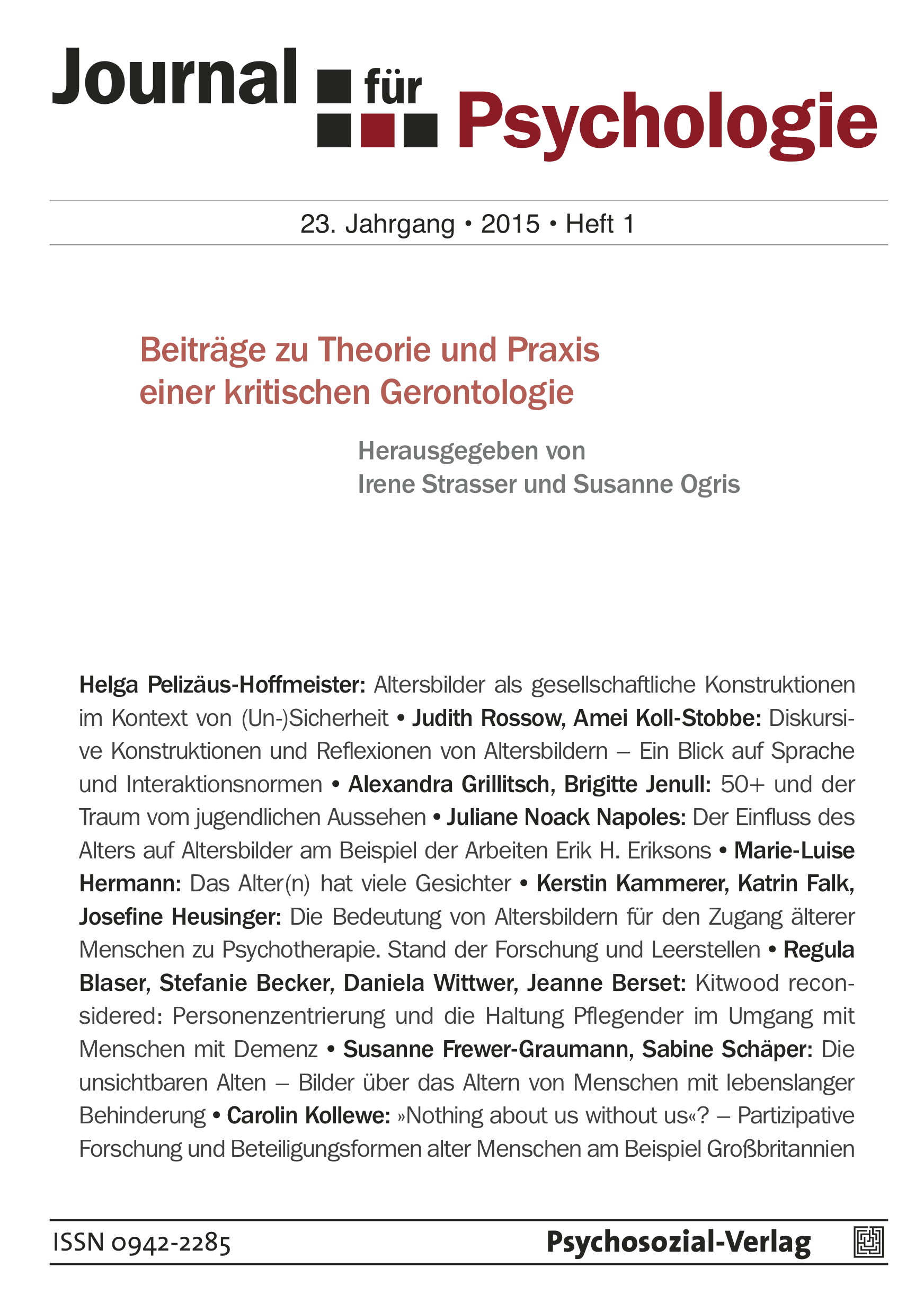Kitwood reconsidered: Person centeredness and nurses’ attitudes on working with persons with dementia
Keywords:
dementia, interaction, attitude, Dementia Attitudes Scale (DAS), Structural Analysis of Social Behavior (SASB)Abstract
Current approaches hardly take the person behind the nurse, with his/her attitudes towards aging and dementia, into account as a part of the interaction with the demented person. This gap is filled by the present study conducted in Switzerland. On one hand data are collected concerning the nurses’ attitudes towards people with dementia, by using the German version of the Dementia Attitudes Scale (DAS). On the other hand the relationship between the nurses’ attitudes and their behavior towards people with dementia is studied. This is done by analyzing videotaped interaction sequences with the examination instrument ‘Structural Analysis of Social Behavior’ (SASB). Results show that the nurses’ attitudes towards people with dementia are mostly positive. Furthermore, it was noticed that the more positive the nurses’ attitudes towards dementia were, the more positive was their behavior towards people with dementia as well. Based on these findings the authors are currently developing interaction-oriented teaching concepts that aim to complement hitherto existing ones.
References
Becker, Stefanie (2012): Das Herz wird nicht dement: Lebensqualität und Glücksgefühle für Menschen mit Demenz. CURAVIVA, 6, 26–29.
Becker, Stefanie; Kaspar, Roman & Kruse, Andreas (2010): Heidelberger Instrument zur Erfassung von Lebensqualität bei demenzkranken Menschen. Bern (Huber).
Becker, Stefanie; Kruse, Andreas; Schröder, Johannes & Seidl, Ulrich (2005): Heidelberger Instrument zur Erfassung von Lebensqualität bei demenzkranken Menschen. Zeitschrift für Gerontologie & Geriatrie, 38, 108–121.
Burgener, Sandy & Twigg, Prudence (2002): Relationships Among Caregiver Factors and Quality of Life in Care Recipients with Irreversible Dementia. Alzheimer Disease and Associated Disorders an International Journal, 16(2), 88–102.
Kitwood, Tom (2008): Der personenzentrierte Ansatz im Umgang mit verwirrten Menschen. 5. Auflage. Bern (Huber).
Lawton, Mortimer; Moos, Miriam; Kleban, Morton; Glicksamn, Allen & Rovine, Michael (1991): A Two-factor Model of Caregiving Appraisal and Psychological Well-Being. The Journal of Gerontology, 46(6), 181–189.
O’Connor, Melissa & McFadden, Susan (2010): Development and Psychometric Validation of the Dementia Attitudes Scale. International Journal of Alzheimer’s Disease, 2010, 10 pages.
Peng, Aristide; Moor, Caroline & Schelling, Hans Rudolf (2011): Einstellungen zu Demenz. Übersetzung und Validierung eines Instruments zur Messung von Einstellungen gegenüber Demenz und demenzkranken Menschen. URL: www.zfg.uzh.ch/projekt/alt/einstell-demenz-2011.html (Stand: 11.09.2014).
Scholl, Jane & Sabat, Steven. (2008): Stereotypes, stereotype threat and ageing: implications for the understanding and treatment of people with Alzheimer’s disease. The International Journal of Ageing & Society, 28, 103–130.
Stechel, Elisabeth; Lämmler, Gernot; Steinhagen-Thiessen, Elisabeth & Flick, Uwe (2007): Subjektive Wahrnehmung und Bewältigung der Demenz im Frühstadium. Eine qualitative Interviewstudie mit Betroffenen und Angehörigen. Zeitschrift für Gerontologie und Geriatrie, 40, 71–80.
Tress, Wolfgang & Hartkamp, Norbert (2002): Die Strukturale Analyse Sozialen Verhaltens Ein Arbeitsbuch für Forschung, Praxis und Weiterbildung in der Psychotherapie. München (CIP-Medien).
Downloads
Published
How to Cite
Issue
Section
License
This license allows private use and unmodified distribution, but prohibits editing and commercial use (further information can be found at: https://creativecommons.org/licenses/by-nc-nd/4.0/).
The terms of the Creative Commons licence only apply to the original material. The reuse of material from other sources (marked with a reference) such as charts, illustrations, photos and text extracts may require further permission for use from the respective copyrights holder.



